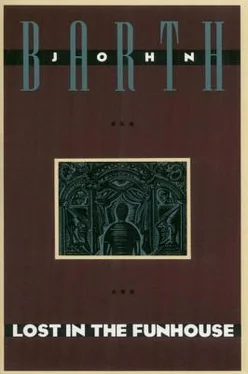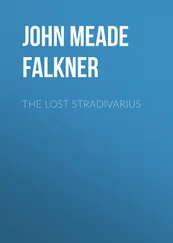John Barth - Lost in the Funhouse
Здесь есть возможность читать онлайн «John Barth - Lost in the Funhouse» весь текст электронной книги совершенно бесплатно (целиком полную версию без сокращений). В некоторых случаях можно слушать аудио, скачать через торрент в формате fb2 и присутствует краткое содержание. Год выпуска: 2014, ISBN: 2014, Издательство: Knopf Doubleday Publishing Group, Жанр: Современная проза, на английском языке. Описание произведения, (предисловие) а так же отзывы посетителей доступны на портале библиотеки ЛибКат.
- Название:Lost in the Funhouse
- Автор:
- Издательство:Knopf Doubleday Publishing Group
- Жанр:
- Год:2014
- ISBN:978-0-8041-5250-1
- Рейтинг книги:3 / 5. Голосов: 1
-
Избранное:Добавить в избранное
- Отзывы:
-
Ваша оценка:
- 60
- 1
- 2
- 3
- 4
- 5
Lost in the Funhouse: краткое содержание, описание и аннотация
Предлагаем к чтению аннотацию, описание, краткое содержание или предисловие (зависит от того, что написал сам автор книги «Lost in the Funhouse»). Если вы не нашли необходимую информацию о книге — напишите в комментариях, мы постараемся отыскать её.
Lost in the Funhouse — читать онлайн бесплатно полную книгу (весь текст) целиком
Ниже представлен текст книги, разбитый по страницам. Система сохранения места последней прочитанной страницы, позволяет с удобством читать онлайн бесплатно книгу «Lost in the Funhouse», без необходимости каждый раз заново искать на чём Вы остановились. Поставьте закладку, и сможете в любой момент перейти на страницу, на которой закончили чтение.
Интервал:
Закладка:
By the seventh jug, after effusions of religious narrative, ribald tale-cycles, verse-dramas, comedies of manners, and what-all, I had begun to run out of world and material — though not of ambition, for I could still delight in the thought of my amphorae floating to the wide world’s shores, being discovered by who knew whom, salvaged from the deep, their contents deciphered and broadcast to the ages. Even when, in black humors, I imagined my opera sinking undiscovered (for all I could tell, none might’ve got past the rocks of my island), or found but untranslated, or translated but ignored, I could yet console myself that Zeus at least, or Poseidon, read my heart’s record. Further, further: should the Olympians themselves prove but dreams of our minstrel souls (I’d changed my own conception of their nature several times), still I could soothe me with the thought that somewhere outside myself my enciphered spirit drifted, realer than the gods, its significance as objective and undecoded as the stars’.
Thus I found strength to fill two more amphorae: the seventh with long prose fictions of the realistical, the romantical, and the fantastical kind, the eighth with comic histories of my spirit, such of its little victories, defeats, insights, blindnesses, et cetera as I deemed might have impersonal resonation or pertinence to the world; I’m no Narcissus. But if I had lost track of time, it had not of me: I was older and slower, more careful but less concerned; as my craft improved, my interest waned, and my earlier zeal seemed hollow as the jugs it filled. Was there any new thing to say, new way to say the old? The memory of literature, my own included, gave me less and less delight; the “immortality” of even the noblest works I knew seemed a paltry thing. It appeared as fine a lot to me, and as poor, to wallow like Aegisthus in the stews as to indite the goldenest verses ever and wallow in the ages’ admiration. As I had used to burn with curiosity to know how it would be to be a Paris or Achilles, and later to know which of my imagined endings to the war would prove the case, but came not to care, so now I was no longer curious even about myself, what I might do next, whether anyone would find me or my scribbles. My last interest in that subject I exhausted with the dregs of Thalia, my eighth muse and mistress. It was in a fit of self-disgust I banged her to potsherds; her cargo then I had to add to Clio’s, and as I watched that stately dame go under beneath her double burden, my heart sank likewise into the dullest deep.
6
A solipsist had better get on well with himself, successfullier than I that ensuing season. Time was when I dreamed of returning to the world; time came when I scattered my beacons lest rescue interrupt me; now I merely sat on the beach, sundried, seasalted: a survival-expert with no will to live. My very name lost sense; anon I forgot it; had “Merope” called again I’d not have known whom she summoned. Once I saw a ship sail by, unless I dreamed it, awfully like Agamemnon’s and almost within hail; I neither hid nor hallooed. Had the King put ashore, I wouldn’t have turned my head. The one remaining amphora stood untapped. Was I thirty? Three thousand thirty? I couldn’t care enough to shrug.
Then one noon, perhaps years later, perhaps that same day, another object hove into my view. Pot-red, bobbing, it was an amphora, barnacled and sea-grown from long voyaging. I watched impassive while wind and tide fetched it shoreward, a revenant of time past; nor was I stirred to salvage when the surf broke it up almost at my feet. Out washed a parchment marked with ink, and came to rest on the foreshore — whence, finally bemused, I retrieved it. The script was run, in places blank; I couldn’t decipher it, or if I did, recognize it as my own, though it may have been.
No matter: a new notion came, as much from the lacunae as from the rest, that roused in me first an echo of my former interest in things, in the end a resolve which if bone-cool was ditto deep: I had thought myself the only stranded spirit, and had survived by sending messages to whom they might concern; now I began to imagine that the world contained another like myself. Indeed, it might be astrew with islèd souls, become minstrels perforce, and the sea a-clink with literature! Alternatively, one or several of my messages may have got through: the document I held might be no ciphered call for aid but a reply, whether from the world or some maroonèd fellow-inks-man: that rescue was on the way; that there was no rescue, for anyone, but my SOS’s had been judged to be not without artistic merit by some who’d happened on them; that I should forget about my plight, a mere scribblers’ hazard, and sing about the goats and flowers instead, the delights of island life, or the goings-on among the strandees of that larger isle the world.
I never ceased to allow the likelihood that the indecipherable ciphers were my own; that the sea had fertilized me as it were with my own seed. No matter, the principle was the same: that I could be thus messaged, even by that stranger my former self, whether or not the fact tied me to the world, inspired me to address it once again. That night I broke Calliope’s aging seal, and if I still forwent her nourishment, my abstinence was rather now prudential or strategic than indifferent.
7
That is to say, I began to envision the possibility of a new work, hopefully surpassing, in any case completing, what I’d done theretofore, my labor’s fulfillment and vindication. I was obliged to plan with more than usual care: not only was there but one jug to sustain my inspiration and bear forth its vintage; there remained also, I found to my dismay, but one goat in the land to skin for writing material. An aging nan she was, lone survivor of the original herd, which I’d slaughtered reckless in my early enthusiasm, supposing them inexhaustible, and only later begun to conserve, until in my late dumps I’d let husbandry go by the board with the rest. That she had no mate, and so I no future vellum, appalled me now; I’d’ve bred her myself hadn’t bigot Nature made love between the species fruitless, for my work in mind was no brief one. But of coming to terms with circumstance I was grown a master: very well, I soon said to myself, it must be managed by the three of us, survivors all: one old goat, one old jug, one old minstrel, we’d expend ourselves in one new song, and then an end to us!
First, however, the doe had to be caught; it was no accident she’d outlived the others. I set about constructing snares, pitfalls, blind mazes, at the same time laying ground-plans for the masterwork in my head. For a long time both eluded me, though vouchsafing distant glimpses of themselves. I’d named the doe Helen , so epic fair she seemed to me in my need, and cause of so great vain toil, but her namesake had never been so hard to get: Artemis had fit her cold fleetness better; Iphigenia my grim plans for her, to launch with her life the expedition of my fancy. Tragedy and satire both deriving, in the lexicon of my inventions, from goat , like the horns from Helen’s head, I came to understand that the new work would combine the two, which I had so to speak kept thitherto in their separate amphorae. For when I reviewed in my imagination the goings-on in Mycenae, Lacedemon, Troy, the circumstances of my life and what they had disclosed to me of capacity and defect, I saw too much of pity and terror merely to laugh; yet about the largest hero, gravest catastrophe, sordidest deed there was too much comic, one way or another, to sustain the epical strut or tragic frown. In the same way, the piece must be no Orphic celebration of the unknowable; time had taught me too much respect for men’s intelligence and resourcefulness, not least my own, and too much doubt of things transcendent, to make a mystic hymnist of me. Yet neither would it be a mere discourse or logic preachment; I was too sensible of the great shadow that surrounds our little lights, like the sea my island shore. Whimsic fantasy, grub fact, pure senseless music — none in itself would do; to embody all and rise above each, in a work neither longfaced nor idiotly grinning, but adventuresome, passionately humored, merry with the pain of insight, wise and smiling in the terror of our life — that was my calm ambition.
Читать дальшеИнтервал:
Закладка:
Похожие книги на «Lost in the Funhouse»
Представляем Вашему вниманию похожие книги на «Lost in the Funhouse» списком для выбора. Мы отобрали схожую по названию и смыслу литературу в надежде предоставить читателям больше вариантов отыскать новые, интересные, ещё непрочитанные произведения.
Обсуждение, отзывы о книге «Lost in the Funhouse» и просто собственные мнения читателей. Оставьте ваши комментарии, напишите, что Вы думаете о произведении, его смысле или главных героях. Укажите что конкретно понравилось, а что нет, и почему Вы так считаете.












